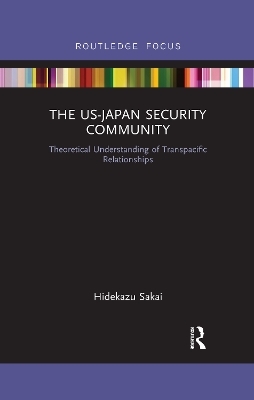
The US-Japan Security Community
Theoretical Understanding of Transpacific Relationships
Seiten
2020
Routledge (Verlag)
978-0-367-48439-2 (ISBN)
Routledge (Verlag)
978-0-367-48439-2 (ISBN)
Sakai argues that the United States and Japan have formed a security community. This book will examine how the United States and Japan interact with one another in their discourses and behaviors during security crises.
Drawing on the work of Karl W. Deutsch, this book argues that the United States and Japan have formed their own security community, based on a sense of “collective identity.” In so doing, it provides a new theoretical outlook on co- operation between the United States and Japan, offering a fresh understanding of their bilateral relationship as one that goes beyond a mere military alliance or free trade partnership.
Taking an empirical approach, Sakai analyzes three key case studies: the Persian Gulf War of 1990–1, the terrorist attacks of September 11, 2001, and the Tohoku Earthquake and Tsunami of 2011. He examines how the United States and Japan interacted with one another in their discourses and behaviors in these three instances and thus demonstrates the existence of a collective identity between the two nations.
Drawing on the work of Karl W. Deutsch, this book argues that the United States and Japan have formed their own security community, based on a sense of “collective identity.” In so doing, it provides a new theoretical outlook on co- operation between the United States and Japan, offering a fresh understanding of their bilateral relationship as one that goes beyond a mere military alliance or free trade partnership.
Taking an empirical approach, Sakai analyzes three key case studies: the Persian Gulf War of 1990–1, the terrorist attacks of September 11, 2001, and the Tohoku Earthquake and Tsunami of 2011. He examines how the United States and Japan interacted with one another in their discourses and behaviors in these three instances and thus demonstrates the existence of a collective identity between the two nations.
Hidekazu Sakai is Associate Professor of Kansai Gaidai University, Japan. His research interests include international relations theory, international security, peacebuilding, and Asian-Pacific politics. His recent publications include Re-rising Japan: Its Strategic Power in International Relations (2017), co-edited with Yoichiro Sato.
1. Puzzles 2. Theory and Methodology 3. Emerging Collective Identity: The Persian Gulf War (1990-1991) 4. Nurturing Collective Identity: The September 11 Terrorist Attacks (2001) 5. Cementing Collective Identity: The Tohoku Earthquake (2011) 6. Conclusion: New Understanding on the U.S.-Japan Relationship
| Erscheinungsdatum | 04.02.2020 |
|---|---|
| Reihe/Serie | Routledge Studies on the Asia-Pacific Region |
| Zusatzinfo | 1 Tables, black and white |
| Verlagsort | London |
| Sprache | englisch |
| Maße | 138 x 216 mm |
| Gewicht | 158 g |
| Themenwelt | Sozialwissenschaften ► Politik / Verwaltung ► Europäische / Internationale Politik |
| Wirtschaft ► Volkswirtschaftslehre ► Wirtschaftspolitik | |
| ISBN-10 | 0-367-48439-0 / 0367484390 |
| ISBN-13 | 978-0-367-48439-2 / 9780367484392 |
| Zustand | Neuware |
| Haben Sie eine Frage zum Produkt? |
Mehr entdecken
aus dem Bereich
aus dem Bereich
Studienbuch
Buch | Hardcover (2023)
De Gruyter Oldenbourg (Verlag)
CHF 62,90
erfolgreiche Interessenvertretung durch Prozesskompetenz im komplexen …
Buch | Hardcover (2023)
Wiley-VCH (Verlag)
CHF 58,75


